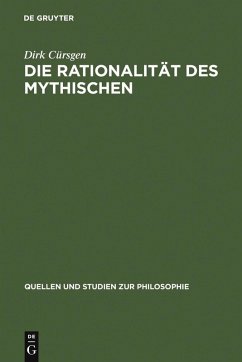
Die Philosophie des Xenokrates im Kontext der Alten Akademie (eBook, PDF)
Versandkostenfrei!
Sofort per Download lieferbar
149,95 €
inkl. MwSt.
Weitere Ausgaben:

PAYBACK Punkte
0 °P sammeln!
Galt Xenokrates in der bisherigen Forschung nur als subalterner Dogmatiker, so wirft diese Arbeit ein neues Licht auf den dritten Akademieleiter. Die Gesamtdarstellung seiner Philosophie enthält neben der Kosmologie, Theologie und Ontologie erstmalig auch seine Prinzipienlehre. Diese findet sich im berühmten Sextus-Bericht, Adv. Math., X §§ 248-283, der auf der Folie der Philosophie des Xenokrates neu gelesen wird. Die darin vorgestellte monistische Prinzipienlehre stammt von Xenokrates, der in seine Berichterstattung über Platons Ungeschriebene Lehre seine eigenen Lehrsätze mit einfli...
Galt Xenokrates in der bisherigen Forschung nur als subalterner Dogmatiker, so wirft diese Arbeit ein neues Licht auf den dritten Akademieleiter. Die Gesamtdarstellung seiner Philosophie enthält neben der Kosmologie, Theologie und Ontologie erstmalig auch seine Prinzipienlehre. Diese findet sich im berühmten Sextus-Bericht, Adv. Math., X §§ 248-283, der auf der Folie der Philosophie des Xenokrates neu gelesen wird. Die darin vorgestellte monistische Prinzipienlehre stammt von Xenokrates, der in seine Berichterstattung über Platons Ungeschriebene Lehre seine eigenen Lehrsätze mit einfließen ließ. Diese Prinzipienlehre stellt das Bindeglied zwischen der Seinsmetaphysik des Aristoteles und der Einheitsmetaphysik Platons dar, da das erste Prinzip, die absolute Monas, nushaft und seinstranszendent ist. Xenokrates erweist sich als platontreuer und innovativer Denker, als 'Fels', auf den Platon seine Lehre und seine Schule gründen konnte.
Dieser Download kann aus rechtlichen Gründen nur mit Rechnungsadresse in A, B, BG, CY, CZ, D, DK, EW, E, FIN, F, GR, HR, H, IRL, I, LT, L, LR, M, NL, PL, P, R, S, SLO, SK ausgeliefert werden.













